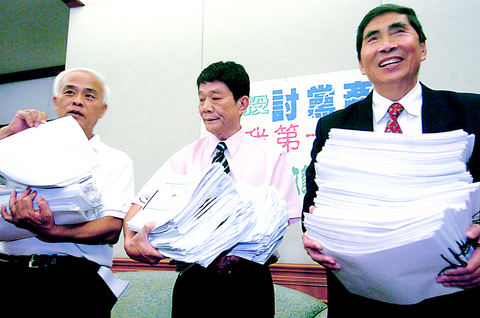A petition calling for a referendum on forcing the Chinese Nationalist Party (KMT) to return stolen assets to the national coffers will be sent to the government for review, as 83,000 signatures have been collected, making it a formal petition.
"If the petition is approved, we have to collect 830,000 signatures within six months to call a referendum," Democratic Progressive Party (DPP) Legislator Chai Trong-rong (蔡同榮) said at a press conference yesterday.
The DPP lawmakers said they hoped the referendum could be held during the next legislative election in December next year.

PHOTO: SEAN CHAO, TAIPEI TIMES
Collecting signatures to call for the referendum is aimed at keeping the KMT from avoiding its obligation to return its assets to the nation and the people, Tsai said.
Considering that it took more than two months for DPP lawmakers to collect the first-stage 83,000 signatures, Tsai said it would not be easy to collect 10 times that number within the six-month time limit.
The KMT is scheduled to issue a report today on how the party has handled its assets. The KMT's rivals describe the assets -- which were acquired from the Japanese colonial government and private businesses and individuals when the KMT took control of Taiwan in 1945 -- as "stolen."
DPP Legislator Yen Wen-chung (
Yen said he suspected that the intention behind Ma's decision to issue a report on the party's assets was, "firstly, to shift responsibility for its shrinking assets to former chairman Lee Teng-hui (
also see story:
Assets report just a Ma makeover

Taiwan is stepping up plans to create self-sufficient supply chains for combat drones and increase foreign orders from the US to counter China’s numerical superiority, a defense official said on Saturday. Commenting on condition of anonymity, the official said the nation’s armed forces are in agreement with US Admiral Samuel Paparo’s assessment that Taiwan’s military must be prepared to turn the nation’s waters into a “hellscape” for the Chinese People’s Liberation Army (PLA). Paparo, the commander of the US Indo-Pacific Command, reiterated the concept during a Congressional hearing in Washington on Wednesday. He first coined the term in a security conference last

DEFENSE: The National Security Bureau promised to expand communication and intelligence cooperation with global partners and enhance its strategic analytical skills China has not only increased military exercises and “gray zone” tactics against Taiwan this year, but also continues to recruit military personnel for espionage, the National Security Bureau (NSB) said yesterday in a report to the Legislative Yuan. The bureau submitted the report ahead of NSB Director-General Tsai Ming-yen’s (蔡明彥) appearance before the Foreign and National Defense Committee today. Last year, the Chinese People’s Liberation Army (PLA) conducted “Joint Sword-2024A and B” military exercises targeting Taiwan and carried out 40 combat readiness patrols, the bureau said. In addition, Chinese military aircraft entered Taiwan’s airspace 3,070 times last year, up about

A magnitude 4.3 earthquake struck eastern Taiwan's Hualien County at 8:31am today, according to the Central Weather Administration (CWA). The epicenter of the temblor was located in Hualien County, about 70.3 kilometers south southwest of Hualien County Hall, at a depth of 23.2km, according to the administration. There were no immediate reports of damage resulting from the quake. The earthquake's intensity, which gauges the actual effect of a temblor, was highest in Taitung County, where it measured 3 on Taiwan's 7-tier intensity scale. The quake also measured an intensity of 2 in Hualien and Nantou counties, the CWA said.

The Overseas Community Affairs Council (OCAC) yesterday announced a fundraising campaign to support survivors of the magnitude 7.7 earthquake that struck Myanmar on March 28, with two prayer events scheduled in Taipei and Taichung later this week. “While initial rescue operations have concluded [in Myanmar], many survivors are now facing increasingly difficult living conditions,” OCAC Minister Hsu Chia-ching (徐佳青) told a news conference in Taipei. The fundraising campaign, which runs through May 31, is focused on supporting the reconstruction of damaged overseas compatriot schools, assisting students from Myanmar in Taiwan, and providing essential items, such as drinking water, food and medical supplies,